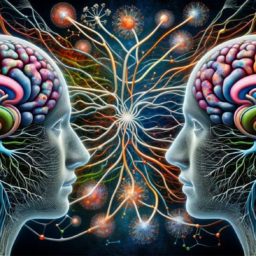
Why is conversation so easy? Abstract Traditional accounts of language processing suggest that monologue – presenting and listening to speeches – should be more straightforward than dialogue – holding a conversation. This is clearly not the case. We argue that conversation is easy because of an interactive processing mechanism that leads to the alignment of … Continue reading Why Is Conversation So Easy? Simon Garrod and Martin J. Pickering

Over many years of elementary school, high school, and even college and graduate school, we’re never explicitly taught to think outside the brain; we’re not shown how to employ our bodies and spaces and relationships in the service of intelligent thought. Yet this instruction is available if we know where to look; our teachers are … Continue reading The Extended Mind: the Power of Thinking Outside the Brain by Annie Murphy Paul (2021)

This is an external resource such as an article, blog. Below is a summary of the key points from the resource, along with a link to the complete article. The full article can be accessed via the link if you would like to read the content in its entirety. Article: Embodied Cognition by Stanford Encyclopedia … Continue reading Embodied Cognition Stanford Encyclopedia of Philosophy (2021)

Conversational Chemistry The Relationship Between Consciousness and Intelligence ** Close Pop-up all posts in this chapter What’s the Vibe? Please be patient as this may take up to a minute to load… Close Human consciousness has long puzzled philosophers and scientists. The hard problem of consciousness grapples with explaining how subjective experiences arise from physical … Continue reading The Nature of Consciousness The mystery of the mind

The Relationship Between Consciousness and Intelligence ** Beyond the Brain Close Pop-up all posts in this chapter What’s the Vibe? Please be patient as this may take up to a minute to load… Close Cognition is a complex process that involves not just our brain but also our physical body, environment, and actions. This is … Continue reading Understanding 4E Cognition The multidimensional nature of cognition

Understanding 4E Cognition Mirror Neurons Close Pop-up all posts in this chapter What’s the Vibe? Please be patient as this may take up to a minute to load… Close Cognition is a complex process that involves not just our brain but also our physical body, environment, and actions. This is the idea behind 4E cognition, … Continue reading Beyond the Brain The multidimensional nature of cognition

Mirror Neurons Mirror Neurons and Interbrain Synchrony Enhancing Conversation ** Close Pop-up all posts in this chapter What’s the Vibe? Please be patient as this may take up to a minute to load… Close Interbrain synchrony occurs when neural activities align between people during social interactions. Understanding this phenomenon can improve communication, teamwork, and learning. … Continue reading Interbrain Synchrony When neural activities align between people during social interactions

Knowledge and Information ** The Knowledge Delusion Close Pop-up all posts in this chapter What’s the Vibe? Please be patient as this may take up to a minute to load… Close The argumentative theory of reasoning proposes that reason did not evolve to help us to reason individually but to reason together – in other … Continue reading The Argumentative Theory of Human Reason We did not evolve to reason individually but to reason socially

Our World Is Complex Our Old Ways of Thinking and Working Are Failing Close Pop-up all posts in this chapter What’s the Vibe? Please be patient as this may take up to a minute to load… Close Humans are extraordinarily complex, shaped by billions of years of evolution. Understanding human systems is challenging because they … Continue reading We Humans Are Complex Human socio-technical systems are complex

The Myth of Thamus and Theuth Connecting Minds Close Pop-up all posts in this chapter What’s the Vibe? Please be patient as this may take up to a minute to load… Close Many of us find it difficult to give a speech, and it is not always easy to listen to one, but we are … Continue reading Our Brains Are Designed for Conversation That is why we find conversation so easy








